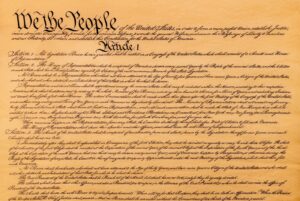Thomas Jefferson called the holidays the season of “greatest mirth and jollity,” but as Americans gather with friends and family this month, recent threats to religious liberty might dampen some of their holiday cheer. Fortunately, Jefferson’s thought also can give hope and encouragement to supporters of religious freedom. After a wearisome election year fraught with animosity and threats to religious freedom, it behooves us to reconsider Jefferson’s advocacy for religious liberty as a cornerstone of our fundamental rights.
Jefferson held deeply conflicted (some would say hostile) views of the religious beliefs of most of his fellow citizens. Despite this, he was devoted to the liberties of all religious believers. Examining his reasons for this might help even those who share his skepticism toward traditional, organized religion to appreciate the case for defending America’s historically broad protections for the free exercise of religion. Jefferson advocated religious freedom not out of any strict pious devotion, but out of his insights into human nature and the nature of good government. These include the view that religious pluralism in tandem with the exercise of enlightened reason is foundational to a well-ordered society.
But it is imperative to distinguish the long-simmering contention and disagreement over Jefferson’s beliefs on religion from his clear public support for religious liberty. When it came to religious freedom and rights of conscience, Jefferson was both a strong critic of official government establishments of religion and a staunch proponent of the free exercise of religion.
When the Constitution was drafted in the summer of 1787, Jefferson was in Paris serving as ambassador to France. Two hundred twenty-five years ago this month, he wrote James Madison to share his thoughts on the recently proposed Constitution. Jefferson’s first and most central complaint was “the omission of a bill of rights providing clearly … for freedom of religion” and for other rights and liberties. The freedoms Jefferson listed in his letter form the core of Madison’s draft of the Bill of Rights, which he introduced in Congress largely due to Jefferson’s urging. In fact, both Jefferson and Madison were so devoted to the natural right of religious freedom that Madison fought to apply the First Amendment’s guarantees to state governments, thereby restricting them from taking actions that violate religious freedom. He did this by proposing additional language stating, “The equal rights of conscience … shall not be infringed by any State.” This addition, which Madison called “the most valuable of the whole list,” passed the House but was rejected by the Senate.
Start your day with Public Discourse
Sign up and get our daily essays sent straight to your inbox.Nevertheless, the First Amendment’s prohibition against federal acts “respecting an establishment of religion” became the law of the land. It was a signal victory for Jefferson’s view that government has no power to interfere with Americans’ religious beliefs or coerce them in any respect, including through the establishment of an official church or religion. Jefferson died more than a century before the US Supreme Court relied on the Fourteenth Amendment to “incorporate” and extend the First Amendment’s restrictions to actions by state governments. But his opposition to the establishment of the Church of England as the official religion of Virginia provides additional evidence that he would have embraced the Supreme Court’s eventual extension of the First Amendment’s provisions to actions by the states.
As for the free exercise of religion, in his Second Inaugural Address (1805), President Jefferson declared, “In matters of religion, I have considered that its free exercise is placed by the Constitution independent of the power of the general [i.e., federal] government….” He emphasized to Americans that in his first term he had “on no occasion” taken “to prescrib[ing] the religious exercises suited to” that free exercise. Instead, he had left religious exercises “under the direction and discipline of State or Church authorities.” Although we know that Jefferson opposed even state religious establishments, as president he was bound by his oath of office to acknowledge the constitutional realities of the day, which still allowed the states to exercise power over matters of religion. However, consistent with his thinking in his masterpiece, the Declaration of Independence, Jefferson was committed to the idea that each person possesses natural rights of religious freedom, and that the First Amendment meant that no religious practice or institution could be codified or prohibited by the federal government.
Despite the caricature of Jefferson’s views on religious freedom by (among others) Justice Hugo Black in Everson v. Board of Education (1947), Jefferson was not a simplistic anti-religious zealot who desired to extinguish all expression of religion from American public life. His “Letter to the Danbury Baptists,” in which he famously used the phrase “wall of separation between Church & State,” has been incorrectly and incoherently treated as his principal and all-encompassing contribution to religious freedom.
As scholars such as James Hutson, a member of the history departments at both Yale and William and Mary, have explained, letters of this type were often written as a form of political action. Hutson argues that Jefferson wrote in order to defend his administration from partisan opponents who were attempting to exploit his opposition to federal proclamations of thanksgiving. Far from articulating “a dispassionate theoretical pronouncement on the relations between government and religion,” Jefferson’s actions surrounding his letter, and the partisan customs of the time, indicate “that he regarded his reply to the Danbury Baptists as a political letter.” In short, one should be careful not to mistake Jefferson’s politicking for constitutional scholarship.
The substitution of the phrase “separation of church and state” for the actual words of the Establishment Clause has had disastrous consequences for Americans’ understanding of religious freedom. Indeed, Philip Hamburger at Columbia Law School has shown that throughout American history partisans have abused Jefferson’s “separation of church and state” to persecute religious minorities. Hamburger’s extensive scholarship on the separation doctrine shows how activist groups and political parties notorious for anti-religious discrimination and fanatical crimes in the post-Reconstruction era “seared the principle of separation into the minds of Americans.”
Yet in the Declaration of Independence’s most resounding statement, Jefferson recognized that it is by our Creator that we are endowed with certain inalienable rights. He painstakingly explained how no king, no government, can justify the seizure or abridgment of these rights.
Laying the groundwork for James Madison’s 1785 defense of the sovereignty of each person over his or her own spirituality, Jefferson wrote in his original 1779 draft of a bill to protect religious freedom in Virginia that the “opinions of men are not the object of civil government, nor under its jurisdiction.” In the version eventually adopted in 1786 as the Virginia Act for Establishing Religious Freedom, Jefferson avowed that “Almighty God hath created the mind free and all attempts to influence it by temporal punishments … are a departure from the plan of the holy author of our religion.” Jefferson’s authorship of the Declaration and of Virginia’s Religious Freedom Act are two of his three accomplishments that he gave directions to have engraved on his tombstone. Although he was attacked for his deism throughout his life, Jefferson demonstrated great reverence for mankind’s inalienable rights and their foundation in a transcendent power distinct from government.
Some cynics demean religious liberty by suggesting it is merely a doctrine that majoritarians use to justify their own rights and position at the expense of the rights of those of a different faith or of no faith at all. In their minds, freedom only can be achieved by cleansing the public square of religion. To the extent these cynics claim Jefferson as their champion, they are victims of ignorance, or are guilty of highly selective parsing of his statements.
Why would a sophisticated thinker like Jefferson, with elaborate reasons buttressing his harsh critique of the Christian beliefs of his contemporaries, promote a position on religious freedom that orthodox believers of many faiths argue for today? Jefferson understood the power that the truth has to prevail in a free and open marketplace of ideas. He of course considered his own understanding of religion to be true, and thought that—if he was indeed correct—his views would eventually win out. Thus he wrote in a letter to a Unitarian minister that “if the freedom of religion, guaranteed to us by law in theory, can ever rise in practice under the overbearing inquisition of public opinion, truth will prevail over fanaticism.” He valued each person’s freedom to pursue and follow truth, and thought civil society would be able to embody greater truth and flourishing only through the free and peaceful exchange of ideas. Instead of opposing religious liberty, those who share Jefferson’s skepticism toward traditional religion thus have good reason to join him in advocating robust rights of free exercise.
Jefferson accepted the importance of religion’s influence in public life even though he questioned the supernatural and revelatory elements of religion. And he considered Americans’ ability to enjoy freedom and exercise their inalienable rights to be contingent upon a basic religious truth—that these rights and freedoms did not come from government but from God. In his Notes on the State of Virginia, he asked rhetorically, “Can the liberties of a nation be secure when we have removed a conviction that these liberties are the gift of God?” In asserting that to be protected, rights and liberties must be seen as coming from a Creator, Jefferson is in full communion with other leading Founders.
Rehabilitating the full record of Jefferson’s views on religious freedom is vital at this time when anti-religious discrimination is increasing. This threat is rooted in the theory of separation in which, as Professor Hamburger explains, “the potential for penalty and discrimination is evident from the very words ‘separation of church and state.’”
The Pew Forum on Religion and Public Life released a study this September showing that this potential for penalty and discrimination is becoming a reality. Pew documented evidence of increased social hostility and government restrictions against religion in America. When compared with the rest of the world, the United States rose from the “low” to the “moderate” category on Pew’s Government Restrictions Index. And because the study only tracks changes through the middle of 2010, federal attacks on conscience protections for healthcare workers in 2011 and the US Department of Health and Human Services contraception mandate in 2012 were not even factored into the study’s results.
Today, some politicians and activists cite “Jefferson’s” views on separation as supposed support for their attempts to reduce religious freedom to the mere “freedom of worship,” a freedom that exists even in some despotic regimes. We see this in the HHS mandate, which denies protection for religious freedom to religious employers who interact with and serve the general public. According to the mandate’s twisted logic, the exercise of religion only may be free—that is, protected from government interference and control—when it is cloistered, not when it is expressed in civil society. But rights of conscience are not merely about what one believes. Believers languishing for their faith in prisons across the globe have the mere freedom to believe. Rights of conscience are about living out those beliefs fully, with public witness. That is why the First Amendment protects “free exercise,” not merely “free worship.”
Reasonable Americans embrace views more in keeping with Jefferson’s statement in the Virginia Religious Freedom Act that only when religious “principles break out into overt acts against peace and good order” should government restrict them. Consider First Lady Michelle Obama’s address earlier this year to her fellow Christians at the African Methodist Episcopal Church’s General Conference. Mrs. Obama said that the faith of millions of Americans is not confined to worship in a building on the weekend: “It’s about what we do Monday through Saturday as well … Jesus didn’t limit his ministry to the four walls of the church. He was out there fighting injustice and speaking truth to power every single day.”
Government officials who exploit the force of law to coerce religious Americans into violating beliefs that their communities have held for centuries or millennia are no heirs of Jefferson. This holiday season, defenders of religious liberty ought to dig back into Jefferson’s record, well beyond freedom-restricting theories of the First Amendment that are founded on seven words in a political letter to a single Baptist congregation. Only then can Americans begin again to appreciate Jefferson’s full legacy on religious freedom as a gift to cherish.













